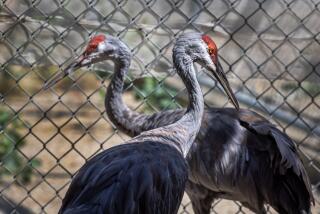Zookeeper Stands by His Animals
- Share via
KABUL, Afghanistan — The Kabul Zoo once was a showpiece in Asia with spacious cages set along a tranquil riverbank. It is in ruins now, a sad monument to the factional fighting that is bleeding Afghanistan.
Only a few animals are left, among them a blind lion and lame black bear maimed by shelling. They are looked after by Aga Akbar, a lanky zookeeper who lived 18 terrible months on the front lines rather than abandon his charges.
Strolling along a rocket-blasted path that follows the Kabul River, Akbar passes a stretch of rubble and sadly notes to a visitor that those were enclosures for the animals he loved.
Kabul was largely spared during the 14-year insurgency by loosely allied Islamic guerrillas who finally ousted a Marxist regime in April 1992. But the city became the main battleground after the former allies quickly fell out and turned their guns on each other.
With a lot of prodding and long, sorrowful pauses, Akbar recalls the long months in 1993 and 1994 when the zoo was smack in the middle of the front line between Afghanistan’s nominal new government and some of its opponents.
“We had an elephant,” he says. “She was a beautiful, expensive animal. When the fighting started, a lot of rockets landed around her. She was so afraid. She didn’t know what was happening. She was running around and around screaming. In about 10 days, she was dead. Shrapnel from a rocket killed her.”
All the elephants are gone. So is the mountain lion and the tiger. So are the foxes and the African monkeys; 60 or so animals dead in all.
The fighting has been pushed away from the zoo, but the memories haunt Akbar: The shrieks and howls of panic-stricken animals. The thuds of exploding rockets. Fighter jets screaming overhead. The pounding chatter of heavy machine guns.
Outside the gates of the zoo, soldiers hunkered in a maze of trenches. Tanks parked at the entrance fired at their enemies on the other side of the street.
Through the worst of the fighting, Akbar stayed. He spent hours huddled like a baby in a womb beneath a slab of stone waiting for the rocketing to stop.
Sometimes he counted the rockets: 90, 100, 200.
“I thought it would never end,” he says.
Whenever there was a lull, he crawled out and ran to his animals.
“I stayed here; I couldn’t leave. I loved these animals.”
Akbar says he couldn’t even bring himself to kill the wounded animals to put them out of their misery.
There was little he could do but offer comfort to the dying. His medical supplies were destroyed when a dozen rockets hit the zoo’s office building. There was no anesthetic to ease the pain of the wounded animals.
Still living on the grounds, Akbar devotes his time to the survivors--two lions, four bears, two wolves, two wild boars, several monkeys and some rare birds.
They are Akbar’s family, says John Joseph of the World Society for the Protection of Animals.
“We were very surprised when we came here,” Joseph says while delivering veterinary supplies. “It’s like the way we would like to see a zoo run if it weren’t in a shambles. What Akbar lacks in expertise he more than makes up for in compassion and care.”
Akbar takes a male lion--named Marjan, Persian meaning coral--for regular walks throughout his grassy enclosure.
The presence of the female lion, Marjan’s companion of 15 years, evokes a few halfhearted roars. Many of his teeth are missing, lost when a soldier threw a grenade in his face. The blast left the beast blind and disfigured.
The soldier wanted to avenge the death of his brother, who had been mauled by Marjan two days earlier, Akbar says.
Red Cross doctors performed surgery on Marjan, removing the lion’s eyes and sewing the mutilated face.
“I remember Akbar was weeping,” says an Afghan journalist.
More to Read
Sign up for Essential California
The most important California stories and recommendations in your inbox every morning.
You may occasionally receive promotional content from the Los Angeles Times.













